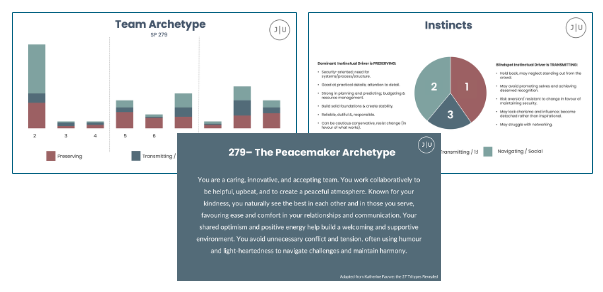When “Nice” Isn’t Enough: A Case Study of a 279 Team Archetype
How insight into a team’s Enneagram personality helped them move from harmony to real effectiveness.
The Challenge
I was invited to work with a leadership team who, on the surface, were thriving. They were warm, loyal, and deeply supportive of one another. Meetings ran smoothly, relationships were amicable, and there was very little visible conflict.
But beneath the surface, things were less rosy.
Important conversations weren’t happening. Issues were smoothed over or reframed positively.
Team members often said yes to new priorities, wanting to come across as a “team player”. But they were overwhelmed and stretched too thin.
Unspoken frustration and resentment resulted in a subtle “gossip culture”, with concerns and complaints shared in side channels instead of being directly addressed.
In Enneagram terms, their collective personality was a 279 archetype: the “good teammates.” Positive, dependable, and deeply caring. But also conflict-averse, overcommitted, and at risk of false harmony.
The Insight
Mapping the team’s archetype gave them language for what they were experiencing:
Strengths to leverage: warmth, loyalty, adaptability, and creating emotional safety.
Blind spots to address: avoidance of conflict, lack of prioritisation, and suppressed individual voices.
For many, it was a revelation to see that their “niceness” was not always a strength. It was keeping them stuck.
And the cost was real. By avoiding tough conversations, underperformance went unchallenged and small issues grew into bigger ones. Because they said yes to too much, critical priorities were diluted, deadlines slipped, and energy was spread thin. The very behaviours that made them such a supportive, dependable team were quietly eroding their effectiveness and credibility as a leadership group.
The Actions They Took
During the course of the workshop, they agreed on three key behaviour shifts the wanted to work towards. They narrowed it down to 3 specific “micro-experiments”:
Introduce Real-Time Candour
Every meeting ended with a simple debrief question: “What’s the one thing I didn’t say but should have?”
This opened the door for tougher issues like addressing team capacity honestly, naming when deadlines were unrealistic, and raising concerns about programme risks before they escalated.
Prioritise With Discipline
Instead of saying yes to every initiative, the team agreed on three “non-negotiable” priorities for the quarter.
This sharpened focus ensured they could deliver reliably on their biggest funding commitments and demonstrate impact to donors.
Voice Individual Perspectives
Team members were encouraged to share their own view before discussion converged.
This surfaced a wider range of insights, from operational realities to stakeholder concerns, reducing the risk of blind spots in project delivery.
Sample slides from Enneagram Team Archetype Workshop
The Impact
I would be lying if I said things around immediately. Sustainable behaviour change of any kind requires daily, intentional effort. But after deliberately focusing on these, and only these three areas, for a few months, the team noticed a shift.
Conversations became more candid. They started talking about real issues like missed deadlines, capacity bottlenecks, and under-delivery.
Workloads felt more manageable, with less hidden resentment, because they were clearer on which initiatives truly mattered and they became more boundaried around their time.
Individual members felt more valued and energised, as their contributions were voiced and their unique expertise acknowledged and welcomed.
Most importantly, the changes translated into business impact:
Donor confidence grew, as the team delivered consistently on their top funding commitments.
Programme quality improved, because risks and concerns were surfaced early instead of being smoothed over.
Credibility as a leadership group strengthened, as staff experienced greater clarity, accountability, and follow-through.
Trust deepened. And not the surface-level harmony of “we get along,” but the robust trust that comes from candour, accountability, and shared purpose.
A 279 team has extraordinary strengths in warmth, loyalty, and team-focus. But without candour and boundaries, those same strengths, when overdone, can hold them back. By seeing themselves clearly through the Enneagram, this team made simple, deliberate shifts and the result was a step-change in effectiveness.
👉 Curious what your team’s archetype might reveal? Let’s talk.


